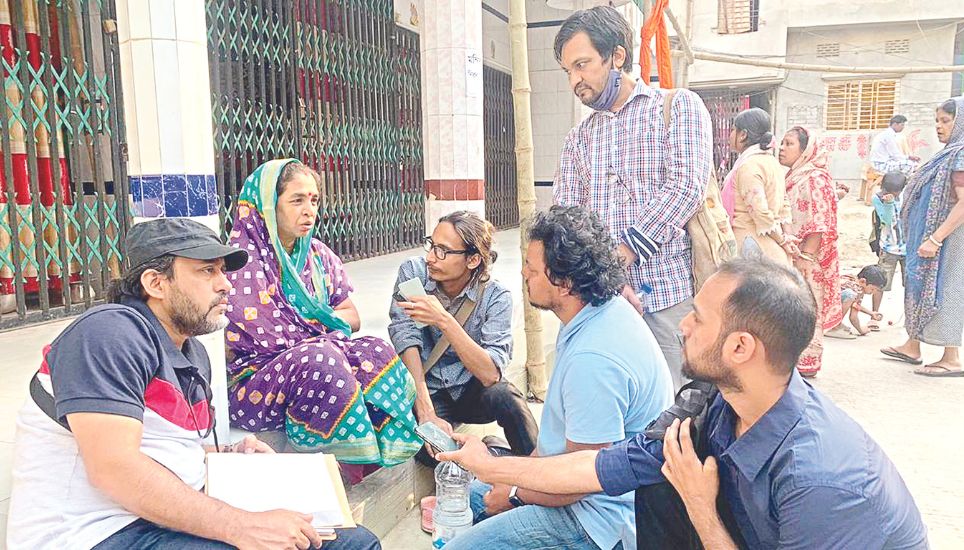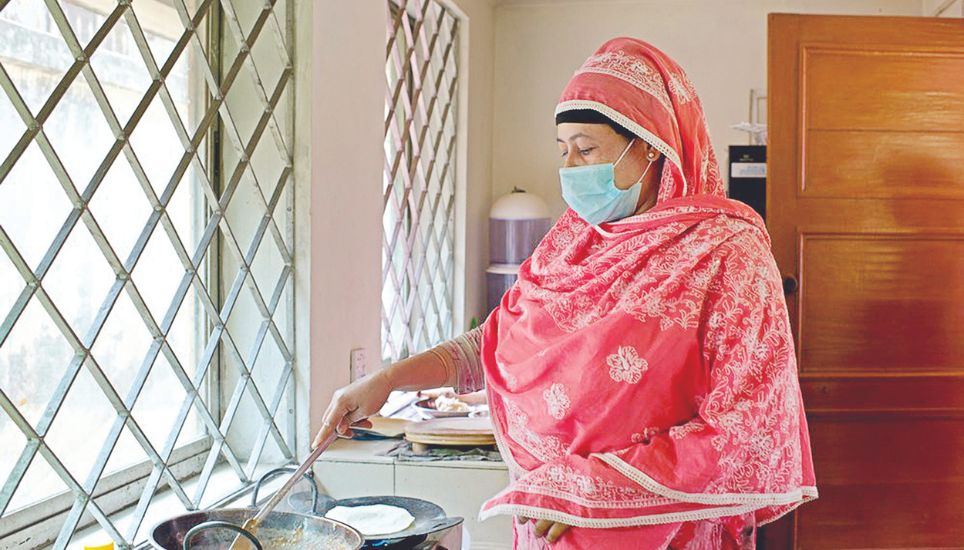
Nasima (an alias), from the Balur Math area in Dhaka city, faced significant challenges after separating from her husband, who was involved in unethical and illegal businesses. Determined to raise her only daughter, Nasima embarked on a journey of survival and perseverance. She decided to work abroad as a labourer, a challenging choice for women in Bangladeshi society.
Amid the Covid-19 pandemic, Nasima found an opportunity to go to Malaysia, securing a job as a domestic worker. To finance her trip, she mortgaged her land and took a microcredit loan. After four months of hard work, Nasima's family's financial situation began to improve. She left her daughter in the care of her elder sister in Bangladesh and sent money home every month.
Nasima's decision to escape her husband's abuse and start a new life with her daughter paid off. Despite initially falling into debt to finance her trip to Malaysia, she repaid all her loans. Nasima became a confident and self-reliant woman, solely bearing the education expenses of her ten-year-old daughter.
In the context of Bangladeshi society, women like Nasima who go abroad for work are often viewed negatively. However, Nasima overcame social barriers and emerged as a remarkable example of resilience. While the media frequently highlights negative stories about female migrant workers, Nasima's story of struggle and success remains underreported. Her journey can serve as an inspiring example for other women considering overseas employment as a path to better their lives.
‘Nokshi Kotha’ project
A research project named "Nokshi Kotha (Woven Words)," conducted under the guidance of Nautanki Theatre in Australia’s Sydney and Bangladeshi theatre workers and migration researchers, has brought to light several inspiring stories of migrant workers who have transformed their lives.
This research-based migration theatre project aims to uncover positive stories of life-changing experiences among returning migrant workers in Bangladesh's labour market. It explores the emotional, social, and economic impacts—both positive and negative—of these workers' experiences.
 Stories of struggle and success
Stories of struggle and success
As part of this initiative, the project conducted interviews with Bangladeshi migrant workers abroad and those who have returned home. A total of 11 interviews revealed diverse stories of migrant workers in various countries.
One such story is that of Helena Begum (an alias), a successful migrant worker who returned from Saudi Arabia. Originally from Dhaka’s Hazaribagh area, Helena's story includes both economic success and harrowing experiences of inhumane treatment. For many Bangladeshi Muslims, Arab countries, especially Saudi Arabia, are seen as sacred lands, and working there is considered safe. However, the reality is different.
In her early thirties, Helena, without any government financial assistance, borrowed money at high interest rates to travel to Saudi Arabia through an agent. She found work as a domestic helper in a Saudi Sheikh's household. Though she received her salary on time and repaid all her debts, her story also includes severe hardships. She worked for four years and returned to Bangladesh, deciding not to go back to Saudi Arabia for a particular reason.
Helena's main complaint about Saudi Arabia was the lack of proper meals provided by her employer. Even during Ramadan, she was not given food for Sehri. Her employer restricted her food intake to ensure she didn't gain weight, which would affect her work. Despite receiving her salary regularly, Helena could not endure the inhumane treatment and returned to Bangladesh. Her experience highlights the lack of freedom for Bangladeshi workers in Saudi Arabia, where foreign workers are often treated as slaves by their employers.
These stories, like that of Helena Begum, challenge the negative stereotypes about female migrant workers frequently portrayed in the media and showcase their resilience and determination to overcome significant obstacles.
Harsh realities
Alongside inspiring stories of resilience, the "Nokshi Kotha" project also highlights the harsh realities faced by many migrant workers. Interviews conducted with migrant workers such as Panulal from Kamrangirchar, Nasim Ali from Savar who worked in Singapore, and Ismail and Zahid from Saudi Arabia, reveal tales of struggle and hardship.
Anisur Rahman, who returned from Qatar, Prabir Kumar from Hazaribagh who worked in Oman, and Shibu Roy and Bimal from South Africa, as well as Kamal from Jelepara who worked in Mauritius, all shared similar experiences of the interplay between joy and sorrow. However, most of their stories revolve around inhumane struggles.
Many of these workers are still burdened with the high-interest loans they took to finance their journeys abroad. Some are still repaying loans to reclaim mortgaged homes or farmland, while others endure gruelling physical labour day and night, often going without food, just to send a small amount of money back to their families in Bangladesh.
It is a common scenario for workers who sold their last possessions to seek fortune abroad only to find little positive change in their lives.
Challenges and exploitation
Interviews with migrant workers returning from countries like Singapore, Malaysia, various African nations, and the Middle East reveal that negative experiences far outweigh positive ones. Many have fallen victim to unscrupulous agents, selling their land to fund their trips. Yet, the dreams that led them to take such risks remain unfulfilled for most.
In the Middle East, Bangladeshi workers often face discrimination in the workplace. Capitalist employers in these regions do not value Bangladeshi labour appropriately. Some interviews revealed that employers in Sharjah (Dubai) and Qatar exploit Bangladeshi workers by making them work for meagre wages.
Participants in the "Nokshi Kotha" project are predominantly from the less-educated or semi-educated lower-middle-class and marginalised communities. The research highlights another significant issue—human trafficking networks in Bangladesh primarily exploit these marginalised groups' lack of education and poverty.
These agents have been luring impoverished people with promises of economic prosperity, fuelling a human trafficking business for nearly 40 years.
 Shifting social values
Shifting social values
The "Nokshi Kotha" project has also revealed the evolving social values within Bangladeshi society. Working abroad is viewed as a prestigious occupation by a certain segment of the population. As a result, many migrant workers endure significant obstacles and inhumane physical and mental abuse just to hold onto low-paying jobs overseas.
Respect and value within one's family often come from earning a foreign salary and sending money home every month. Some interviews revealed that children prefer their fathers who work abroad because they fulfil all their economic demands.
One housewife expressed her desire for her husband to remain abroad and send money monthly, as this maintains her special status at her parents' home.
In some cases, children like those of Helena (an alias) want their mother to return to Saudi Arabia despite the inhumane conditions she faced, such as severe food deprivation. Their reasoning is that her monthly salary ensures the family's financial stability.
This shift in social values is evident in the way migrant workers and their families perceive respect and relationships. Working abroad and sending money home has become a significant measure of an individual's status and worth in their community.
The project highlights how these changing perspectives influence the social fabric of Bangladeshi society, particularly among migrant workers and their families.
Research and presentations
The "Nokshi Kotha" project began with the aim of documenting the lives and experiences of migrant workers. Neel Banerjee, the founder and creative director of Nautanki Theatre from West Bengal, visited Bangladesh in 2023 to collect research data. The project received significant support from theatre groups in Dhaka.
The project is spearheaded by Neel Banerjee, with Ahmed Abid, a research fellow at Western Sydney University in Australia, serving as the managing director and research advisor. Additionally, Tanvir Ahmed, a lecturer at BRAC University, contributed to the project as a research associate, handling audio transcription, data coding, and analysis.
A presentation on the research project will be presented on August 31 at the ICAS-13 conference in the Negotiating Margins : Representations, Resistances, Agencies. Neel Banerjee will present a creative depiction of the social and economic changes in the lives of migrant workers, using theatre performances as an example.
Furthermore, the project's findings will be published in international journals and disseminated through various media outlets both within and outside the country.